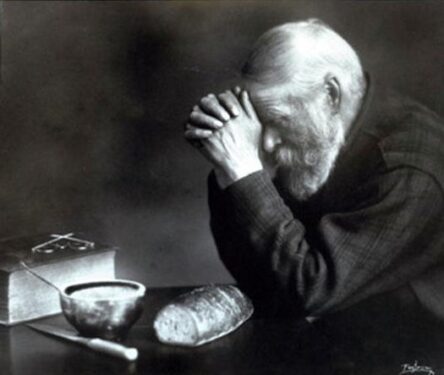During the pandemic, I not only spent a considerable amount of time praying, but I also thought a great deal about the nature of prayer, what it should mean in our lives, what we do when we pray.

For many years whenever I thought about the nature of prayer, the following words entered my mind: “Prayer is the raising of the mind and heart to God.” I imagine I learned that definition from the catechism I studied when I was in Catholic grammar school. It is impressive how a definition would stay with me that long a time. I do not think that this definition is erroneous, but perhaps there is a better way to think about prayer. I can recall the exact moment I changed my view of prayer. It was when I read Gregory Baum’s provocative book “Man Becoming.”
Baum’s book caused me to rethink many ideas that I had held for a long time. I came to believe that rather than describing prayer as raising the mind and heart to God, a better description might be that prayer is hearing and responding to God’s Word.
The difficulty I have with the definition I embraced for so many years is that it can give the impression that we start the prayer process — that movement toward God begins with us. It can give the impression that we on our own reach out to God. It can suggest that we pick ourselves up by our bootstraps and start communication with God. For me, describing prayer as hearing and responding to God’s Word clarifies that prayer begins with God reaching out to us. Prayer, I think, is impossible without God’s initiative.
An obvious illustration of hearing and responding to the Word of God is Eucharistic prayer. We hear God’s Word in the readings from scripture and the homily, and then we respond by offering ourselves to God with our offering of the bread and wine and also with our offering of the Risen Christ to His Father. I think it is imperative to realize that hearing and responding to God’s Word is not limited to a Eucharistic celebration. We can hear God’s Word at any time and in any place, and we can respond at any time and in any location.
Of course, when I say “hear” God’s Word, I do not mean that the “hearing” necessarily happens in our ears. I mean, the Holy Spirit communicates with us, and prayer occurs when we respond. This communication can happen through the beauty of nature or by observing other people’s goodness, reading a newspaper or a book, or watching television news. The Holy Spirit breathes where he will! I think of God as being everywhere trying to communicate with us, trying to encourage us to respond to God’s loving presence freely. Whenever and however we respond to God’s presence, our response is prayer.
As I am writing this column, I recall the seemingly endless discussions I had with my friends when we were seminarians about being so busy after ordination that we might neglect our prayer life. I now think that we had a very narrow view of prayer. If we are busy trying to help others, either that is a prayer, hearing, and responding to God’s Word or worthless activity. What I am suggesting is that many people may be praying without thinking of their actions as prayers.
In order to hear and respond to God’s Word, it is probably necessary to engage in more formal prayer types, such as attending Eucharistic celebrations or saying the rosary, or meditating on sacred scripture. Without engaging in some traditional prayer, we might be making it less possible to “hear” and “respond” to God’s Word in our daily lives. I do not believe that when we respond to God’s Word, we must explicitly be aware that we respond to God’s Word. I imagine that many people trying to lead good lives are “responding” without explicitly being mindful when they respond that they are responding to the Holy Spirit’s presence.
As difficult as the experience has been, I am thinking of the pandemic as an exceptional opportunity to hear and respond to God’s Word. I am not suggesting that God sent the pandemic to us but rather that God has been present in the pandemic, perhaps calling us to a deeper relationship. When we have been challenged and tempted in various ways during the pandemic, we may have struggled to find God’s presence. I wonder if a more accurate way of looking at our experience during the pandemic is to think of God reaching out to us.
Father Lauder is a philosophy professor at St. John’s University, Jamaica. He presents two 15-minute talks from his lecture series on the Catholic Novel, 10:30 a.m. Monday through Friday on NET-TV.
